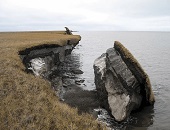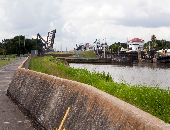The Weight of Nature
The book The Weight of Nature: How a Changing Climate Changes Our Brains by Clayton Page Aldern was launched on April 9, 2024 by Dutton Press. The march of climate change is stunning and vicious, with rising seas, extreme weather, and oppressive heat blanketing the globe. But its effects on our very brains constitute a public-health crisis that has gone largely unreported. Based on seven years of research, this book by the award-winning journalist and trained neuroscientist Clayton Page Aldern, synthesizes the emerging neuroscience, psychology, and behavioral economics of global warming and brain health. A masterpiece of literary journalism, this […]
On the Move
“Humanity is on the precipice of a great climate migration, and Americans will not be spared,” says Abrahm Lustgarten, the author of a new book released March 26, 2024. “Tens of millions of people are likely to be driven from the places they call home. Poorer communities will be left behind, while growth will surge in the cities and regions most attractive to climate refugees. America will be changed utterly.” On the Move: The Overheating Earth and the Uprooting of America by Abrahm Lustgarten is a new book published by Farrar, Straus & Giroux. It is a vivid, journalistic account […]
Decarb Economics 101
To mitigate the consequences of climate change, the world requires international coordination. In 2015, the Paris Agreement was signed by 195 nations. Its long-term temperature goal is to keep the rise in mean global temperature to well below 2°C (3.6 °F) above pre-industrial levels, and preferably limit the increase to 1.5 °C (2.7 °F), which would reduce the worst effects of climate change. Many countries are developing policies to get themselves on a path toward achieving the agreed-upon 1.5 °C goal. Although present progress may seem piecemeal, in the words of a Chinese proverb, “A great journey begins with a single step.” The figure below […]
Free the Data
Hurricanes, floods, heat waves, droughts: weather events are increasing in severity as the earth’s atmosphere warms. The consensus is that we need to reduce greenhouse gas (GHG) emissions. Yet recent reports show waning interest in initiatives such as Climate Action 100+. “When performance is measured, performance improves,” according to Pearson’s law, and “when performance is measured and reported back, the rate of improvement accelerates.” Such is the reasoning behind the data repository known as the Net-Zero Data Public Utility (NZDPU). On February 21, 2024, three panelists from NZDPU spoke about the “why” and the “how” of their new organization. The […]
R.I.P. Ross Gelbspan
Approximately three decades ago, scientists studying the earth’s atmosphere began to raise concerns about global warming. To counteract the public outcry, certain research institutions promoted the message that “everything was okay.” Soon, a campaign of disinformation by oil and gas lobbyists to sow doubt about their findings. One journalist, Ross Gelbspan, dug deep into the research. He looked at who funded the research and found the oil & gas industry was covertly funding climate change denialism. His series of articles alerted the public that there was a campaign to deny climate change. The articles, collected, formed the book The Heat […]
Tax or Cap?
Carbon tax or cap and trade? These are terms bandied about in the political arena as countries decide how to address global warming. “There is a clear consensus among economists,” said Roger Gordon, professor of economics at University of California at San Diego, “that the best way to address global warming is through the global use of a carbon tax on CO2 emissions.” On January 18, 2024, he was speaking at a webinar as part of the biweekly series of talks, titled the Virtual Seminar on Climate Economics, sponsored by the Federal Reserve Bank of San Francisco (FRBSF). “With a carbon tax,” […]
Diversifying Wildfire Risk
Climate change is altering risk profiles the world over. In the US, it has led to an increase in wildfire season length, wildfire frequency, and the size of burned area. When it comes to such disasters, is the economic risk only borne by those in the risky area, or can the economic risk be shared among investors? A recent webinar looked at a longstanding tool for financial adaptation. For nearly a century, mortgages have been used to create mortgage-backed securities (MBSs) in order to share the risk (and thus the return) of financing real estate. “What are the benefits of […]
California Perspective
Imagine feeling shut out from important decisions in your community. Imagine feeling you were always the last choice when it came to hiring for the good jobs. If social studies showed this was always due to systemic bias, wouldn’t you want to work for change—if not for yourself, at least for the generation to come? This is the motivation behind the movement for diversity, equity, and inclusion (DEI). What are the fundamental principles to accelerate change around DEI? Can financial institutions adapt to DEI—and can their regulatory body, CFA Institute, lead the way? To showcase thriving financial institutions that have […]
Resilient earth?
As 2023 draws to a close, we see increasingly severe climate outcomes around the world—from rising emissions to severe weather events, to increased food and water inequality. Three days before the United Nations Climate Change Conference COP 28 began, a multidisciplinary research organization welcomed scientific panellists to a webinar for an audience of hundreds on November 27, 2023, titled “Nurturing a Resilient Earth.” The virtual event, sponsored by CIFAR (Canadian Institute for Advanced Research), convened an interdisciplinary panel of four top researchers. The discussion was moderated by Stephen Toope, President & CEO of CIFAR, and the author most recently of A […]
Flood Economics
When it comes to natural disasters such as flooding, does it make more economic sense to control the flood? Or to sit back, suffer the consequences, and count on insurance? Climate change leads to more frequent and more intense flooding. As these risks intensify, public funds will often be used to protect communities. Recent work done by economists estimates the amount and distribution of benefits from a major form of public flood risk adaptation, flood control levees. A levee is an embankment built to prevent the overflow of a river. The efficiency and equity implications of levees were investigated by […]










